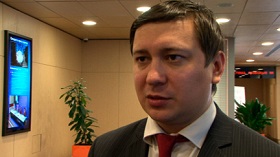At the end of 2014, the key document settling the issue of Iran's nuclear program was not signed, dashing all hope for the conclusion of what would have been the deal of the year. Representatives of the delegations involved in the negotiations postponed the signing to June 2015. Over the next six months, the parties will hold a series of meetings to resolve technical and political differences hampering the reaching and implementation of a comprehensive agreement. However, this is not the only factor that could hinder the resolution of the long-standing conflict. Anton Khlopkov, Director of the Center for Energy and Security Studies, shares his insights on the situation.
At the end of 2014, the key document settling the issue of Iran's nuclear program was not signed, dashing all hope for the conclusion of what would have been the deal of the year. Representatives of the delegations involved in the negotiations postponed the signing to June 2015. Over the next six months, the parties will hold a series of meetings to resolve technical and political differences hampering the reaching and implementation of a comprehensive agreement. However, this is not the only factor that could hinder the resolution of the long-standing conflict. Anton Khlopkov, Director of the Center for Energy and Security Studies, shares his insights on the situation.
What are your impressions of the meeting between U.S. Secretary of State John Kerry and Iranian Foreign Minister Javad Zarif in Geneva on January 14, 2015?
It is not quite accurate to talk about the outcome of the meeting between U.S. Secretary of State John Kerry and Iranian Foreign Minister Javad Zarif alone, as it was just one element in the broader negotiation process in which six international mediators and Iran are working toward a comprehensive agreement on the Iranian nuclear program. It would be appropriate to evaluate the results of the whole complex of the latest round of talks, held in Geneva on January 14-18, in different discussion formats.
Unfortunately, recent months have seen little progress toward resolving controversial issues in the draft agreement, namely the volume of uranium enrichment in Iran stipulated by the comprehensive agreement to resolve the crisis; solutions regarding the heavy water reactor in Arak; the term of the comprehensive agreement that is currently being negotiated in Geneva by the P5+1 group and Iran. It seems that we are going in circles and are not making significant progress, while Washington and Tehran lack the political will to achieve a breakthrough.
Given the negotiations’ pace and recent trends, I would not rule out that the development of the political framework for the agreement could end up taking longer than was expected (by the end of March 2015).
In your opinion, how long will the negotiations last? Can a comprehensive agreement be concluded in 2015?
In November 2014 it was agreed to extend negotiations until the end of June 2015, and it was expected that the political framework for the agreement would be developed by the end of March 2015. This latter date was selected carefully, because the 2015 Review Conference of the Parties to the Treaty on the Non-Proliferation of Nuclear Weapons (NPT) is scheduled to take part in April and May. Positive developments in resolving the Iranian crisis would contribute to the Conference’s success, which appears to suit the interests of the P5+1 group and Iran.
There is little doubt that extending the negotiation term reinforces the positions of the centrifugal forces that oppose an agreement. Suffice it to say that a campaign to support new sanctions against the Islamic Republic of Iran is gaining momentum in the U.S. Congress. Any such decision would further complicate the reaching of an agreement in Vienna negotiations. There are also conservative forces in Iran who do not want to see an agreement reached, at least not on the basis that the delegations are promoting today. In my opinion, there is also an impact on the Iranian position in the negotiations. Serious efforts need to be made, not in the Geneva and Vienna talks, but in Washington and Tehran, where the delegations must convince the countries’ top leadership of the need to make significant compromises in order to reach a comprehensive agreement. It is important that the leaderships of both Iran and the United States take some political risk and accept these compromises.
Interviewer: RIAC Program Assistant Maria Gurova




